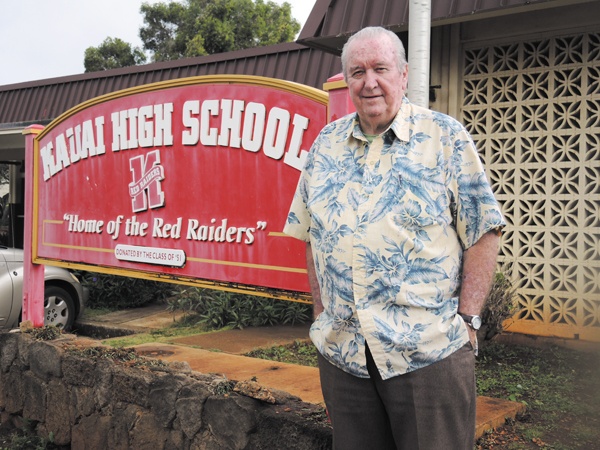LIHUE — John Hoff began substitute teaching in Kauai schools 14 years ago and is currently on a long-term assignment at Kauai High School.
He continues to teach even though he feels cheated out of his wages by the Department of Education.
Hoff and 9,000 other Hawaii substitute teachers were due back pay from a ruling in which the DOE violated a 1996 law requiring equal pay step increases for substitute teachers in relation to permanent full-time teachers.
“They told me I’d get $8,500, but when I got my check, they took 30 percent of my salary to pay for the DOE’s mistake,” Hoff said. “I agree the attorneys should get paid. But they took 30 percent of my wages to pay the attorneys. I don’t think that money should come out of teachers’ salaries.”
Attorney fees and interest incomes are bones of contention some teachers have with their slow settlements.
“The DOE was withholding our pay,” Hoff said. “They were embezzling and they got caught.”
Paul Alston said his law firm, Alston, Hunt, Floyd and Ing, is pursuing a resolution for the Hawaii teachers. He contends that more than 10 years of time and over $40 million in underpayments to teachers could have been avoided if the Department of Education had simply followed the law.
The attorneys plan to recover legal fees from the state in the future, as soon as the remaining claims have been resolved. Under state law, the DOE must pay legal fees, which have accumulated since the lawyers took on cases against the DOE in November 2002.
Their first victory in the underpayment of substitute teachers came in 2005. The underpaid tab to the teachers was $13.9 million.
Kauai substitute and part-time teachers are beginning to get those delayed payments due to them after the Intermediate Court of Appeals decided the liability issue on appeal. The dollar amount of the first award, a partial settlement agreement, impacted teachers’ pay between 2000 to 2005.
However, recovering the over $4 million in accumulated legal fees over the past decade is still an uphill battle, according to Alston.
Because the lawyers worked on a contingency fee basis, the lawyers were paid by the teachers, as is customary in class action cases intended to produce a “common benefit” for the people who will receive damages.
In those cases, the customary “benchmark fee” is 25 percent of the benefit, and that is what was awarded by the court in the pending case for the substitute teachers.
According to Alston, state laws will allow the teachers to eventually recover some fees from the DOE.
Hoff feels impatient and wronged, having to incur legal fees and the interest he had expected on his delayed wages. He talked about a single mom who works two jobs, one as a substitute teacher.
“She was supposed to get $14,000 back for underpayments and thought she might be able to buy a new car,” Hoff recalled.
Carmen Legacy, who has been substitute teaching since 2000, voiced similar frustrations.
“I never looked online to research what I was supposed to be getting, so I didn’t know what to expect,” Legacy said. “But John (Hoff) told me, with interest, I was due to be paid $990.”
Her check was $430 for backpay after state and federal deductions. Legal fees also reduced her anticipated windfall.
“When I heard about it, I was looking forward to getting the extra money in my pocket,” Legacy said. “Then I got it and thought, ‘Gee, that wasn’t very much.’”
Alston’s battle for the teachers now includes pursuing a ruling for the part-time teachers and combination substitute/part-time teachers who were also underpaid.
That tab, according to an expert hired by Alston’s firm, is over $40 million.
They will be pursuing $9.5 million in interest income for the substitute teachers plus over $30 million in wages for 40,000 part-time teachers and well over $4 million in attorney’s fees.
“I wish the attorney general would have an epiphany and just say we’re (the state) going to pay,” Alston said.
The DOE declined to comment and referred questions to the AG’s office, who did not respond by Monday.
Alston is expecting another round of checks to be issued to teachers before the end of 2015. The good news, according to Alston, is that even though the pay claims arose years ago, less than 6 percent of the total recovery remains to be claimed by teachers.
• Lisa Ann Capozzi, features and education reporter, can be reached at 245-0452 or lcapozzi@thegardenisland.com.




